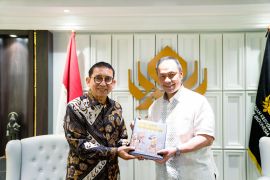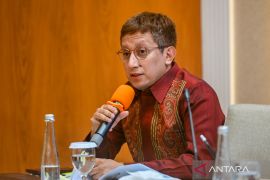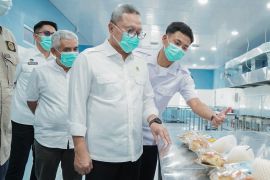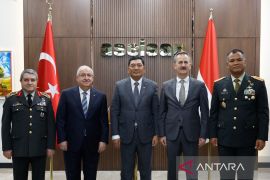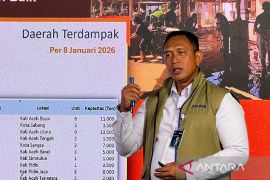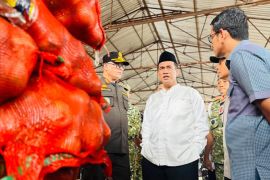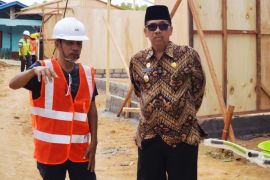"Both national and international organising committees have planned well."Jakarta (ANTARA News) - The fourth International Consortium for Social Development-Asia Pacific (ICSD-AP) conference in Yogyakarta from June 27-30, 2012, is expected to provide a boost to social development in various fields.
Hosted by the Ministry of Social Affairs and the Indonesian Social Work Consortium, the conference is part of the government's efforts to develop new social development strategies in line with post-2015 Millennium Development Goals (MDGs).
The ICSD-AP 2012 is an academic forum, as well as a policy-based forum, which will discuss social development in the context of post-2015 MDGs.
At the conference, researchers and scholars will share and discuss not only the theories, methods, approaches and programmes of social development that are already being implemented within the framework of the current MDGs, but also new innovative approaches or programmes.
There will also be intellectual debates on innovative approaches, programmes and policies in social development, which are regarded as important contributions to the social development efforts for post-2015 MDGs.
The conference will also facilitate dialogues among social development policymakers in the Asia-Pacific region and involve international development institutions in the process.
Themed "Envisioning New Social Development Strategies Beyond Millennium Development Goals", the conference is being attended by intellectuals, experts, social observers, and development actors from Asia-Pacific countries, the US, and the UK.
Indonesian Social Work Consortium Chairman Toto Utomo Budi Santoso said the conference would discuss social development in the context of post-2015 Millennium Development Goals (MDGs).
"The conference would serve two broad objectives," he stated.
"The first is to explore the lessons learned from the current MDG efforts in the Asia-Pacific region, and the second is to envision and initiate a preliminary discussion about new possible social development strategies for the post-2015 period," Toto said.
He also expressed hope that the conference would facilitate a productive exchange of ideas and experiences among participants, which would eventually steer future efforts to address the most pressing social problems.
Meanwhile, ICSD-AP President Manohar Pawar said: "The theme of the conference is an important one, because the participants need to collectively deliberate and act to end poverty and promote health, education, gender balance, environment and partnership and cooperation beyond 2015."
"Both national and international organising committees have planned well and are working hard to hold this conference," the Professor of Social Work, Charles Sturt University, Australia, noted.
Pawar said the conference would feature workshops and sessions, which were expected to result in a series of publications on social development, social action, and post-2015 MDGs.
In his opening address on Wednesday, Social Affairs Minister Salim Segaf Al Jufri called on the participants of the forum to set up an "early warning system" to prevent social disasters.
"I would like this forum to make efforts to prevent social disasters in light of the emergence of various social issues," he said.
The minister also expressed hope that the conference would reflect how the region has benefitted from the government's policies and social development programmes.
On various previous occasions, Salim Segaf has emphasised the importance of an early warning system (EWS) for averting social disaster.
At a recent gathering in Central Sulawesi, the social affairs minister said: "It is necessary that we have an early warning system to anticipate and prevent a social disaster from happening."
Citing a recent study, Salim Segaf pointed out that children who played too much with toy weapons were likely to use the real ones after growing up.
But an early warning system, coupled with social solidarity and "the spirit of mutual help", he said, could help prevent social crimes and disasters.
Therefore, the minister added, it was necessary for universities to conduct more research studies in order to find out the root causes of social conflicts and develop an effective early warning system.
According to Salim Segaf, social disaster must be a matter of concern for everybody because it has the potential to disintegrate the society.
He noted that around 170 areas across the country were vulnerable to social conflict.
Salim Segaf pointed out that differences in perception were a contributing factor to social disasters such as brawls and clashes between neighbourhood communities.
"Social disasters occur when people lack a sense of community and solidarity," the minister said, adding that social disasters such as student brawls, ethnic conflicts, and mass violence would continue to happen across the country if people failed to cultivate a sense of unity.
He stated that social disasters could be eliminated only if people regarded each other as their own kin.
"I am certain that nobody will hurt his or her own parents, brothers and sister, or even his or her close friends," Salim Segaf explained.
He said the spirit of mutual help needed to be rekindled in the country, adding that addressing social issues was not only the responsibility of the government but also of every citizen.
(T.O001/INE/B003/KR-BSR/B014)
Reporter: Otniel Tamindael
Editor: Priyambodo RH
Copyright © ANTARA 2012




